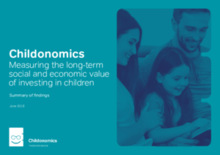This paper summarises the main concepts behind Childonomics and presents the key findings so far. It is based on research carried out between June 2016 and December 2017 which developed a methodology, based on a Cost Consequence Analysis approach, to help reflect on the long-term social and economic return of investing in children and families. The methodology was tested in Malta and Romania.
This work should be seen as a first step in better understanding inputs, outputs and outcomes linked to policies, services and public spending choices. The study is necessarily incomplete because of the lack of data – especially longitudinal data - and effective monitoring systems. Drawing causal links between what is spent on services and outcomes for children and families was not possible in the scope of this project. Nonetheless the study highlights the importance of taking a systemic approach to child and family services, to being more attentive to the outcomes interventions aim to achieve, and to ensuring effective data gathering and monitoring systems.
Eurochild hopes the methodology will be tested in other countries or regions in the future. Eurochild believes more economic modelling and analysis is needed in the social welfare sector, whilst building on a rights-based approach. The methodology developed through Childonomics allows consideration of a large range of nuance and context. It assembles different costs and outcomes and also places an emphasis on strength of evidence. Most importantly it is an empowering and inclusive methodology, which places particular importance on listening to the views of children and families themselves.

